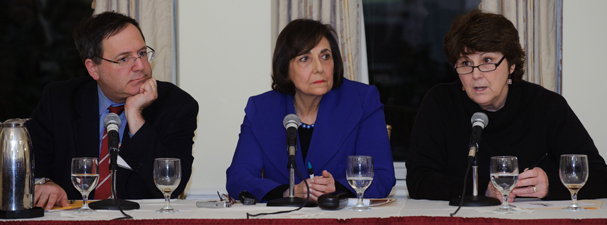Foreign Policy and National Security Challenges for the Obama Administration
Karen DeYoung, Senior Diplomatic Correspondent, The Washington Post
David Sanger, Chief Washington Correspondent, The New York Times
Photos | Transcript
 |
 |
Washington, DC—On January 24, 2011, Karen DeYoung, Senior Diplomatic Correspondent for The Washington Post and David Sanger, Chief Washington Correspondent for The New York Times, addressed WFPG on foreign policy and national security challenges for the Obama Administration. Karen DeYoung discussed the situation on the ground in Afghanistan and how US priorities in the region have changed from an emphasis on military victory to a political settlement. Although members of the Administration, including General Petraeus, have maintained that the surge is working, the Obama Administration’s key goals include facilitating a gradual transfer of security to the Afghan military, preventing the further expansion of Taliban influence, and supporting a civilian government that has the ability to command loyalty from its citizens.
Since the Administration views the challenges in Afghanistan in a regional context, it believes that the situation in Afghanistan cannot be resolved without first dealing with Pakistan. The US is especially concerned about vulnerable areas like North Waziristan where the Taliban is strong, and where the US wants more help from Pakistan than Pakistan has given. Another major priority is securing the nation’s nuclear arsenal in case of insurgent infiltration. At the same time, the Administration is also facing the challenge of declining public support in the US for the war.
David Sanger focused on how China, Iran, and North Korea present a variety of possibilities and limits of President Obama’s policy of “engagement”. China is a very complicated issue, given its multifaceted relationship with the United States. Addressing Chinese President Hu Jintao’s recent visit, Sanger said that China’s fast-rising global prominence makes China a potential rival to the US. The relationship’s “thorniest issues” relate to Chinese military capability and a growing ideological gap between China’s different generations of military leaders, not the currency issue which gets the most attention. The good news for the US is that China is confronting many domestic issues, including stark income inequality, rampant inflation, polluted cities, and water and energy problems.
In terms of Iran, Sanger noted that the Obama Administration took the issue on right away by imposing tougher sanctions that have hurt the nation, but not enough to make them more cooperative. Iran has engaged in talks with the United States and other nations, but like the recent talks in Turkey, they collapsed. North Korea is an opposite problem because, unlike Iran, it is a nuclear power where the government’s actions are unpredictable. Sanger suggested that its recent attacks on South Korea are related to the transition of power from Kim Jong-il to his son, Kim Jong-un, who is using these attacks to boost his military credentials.
During the Q&A, both Sanger and DeYoung took questions on a broad range of issues including the ouster of Tunisian President Ben Ali, the role of the G20, the financial crisis in Europe, the emergence of Brazil, and the impact of recently released Wikileaks documents on alleged Palestinian concessions to Israel.
|